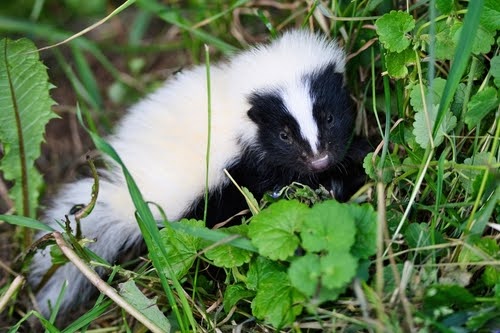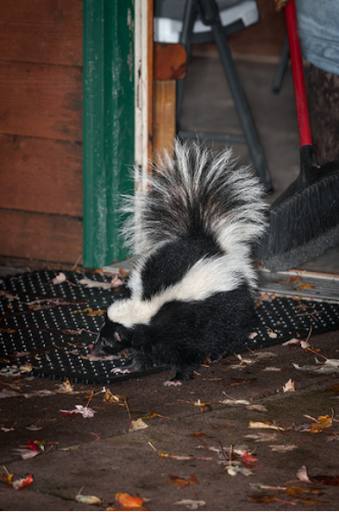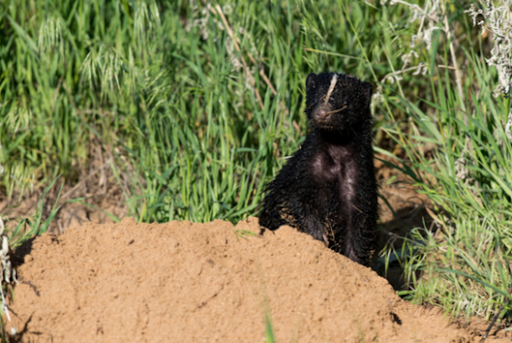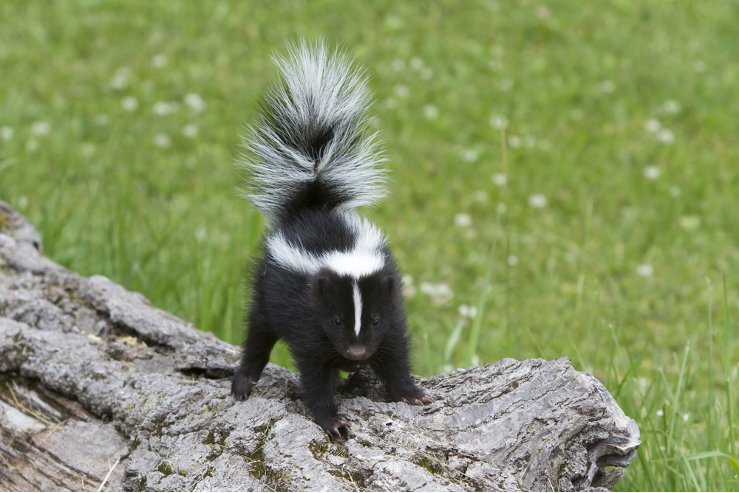Everyone has heard horror stories about skunks and their smelly spray. This makes it hard not to panic when you cross paths with one. However, skunks are far less wrathful and prone to rogue spraying than their reputation implies. In fact, they are naturally shy, mild-mannered creatures. Learning more about where skunks live, how to prevent problematic interactions with them, and what to do if you encounter one can build your confidence and help keep you calm.
If you interact with a skunk, you may have a slew of questions. Will skunks chase you? How far can a skunk spray? Are skunks dangerous? Will you have to spend the next several days bathing in tomato juice? Let’s dive in.
Where You’ll Find Skunks: Where Do They Live?
Skunks are common throughout all of North America. You might encounter a skunk everywhere, from Canada all the way down to Mexico. They prefer forested areas and often make their homes within a few miles of a water source, but they can be comfortable near humans.
What Kind of Skunks Are There?
The striped skunk (Mephitis mephitis) is the most common type in North America. Recognized by two white stripes down its back, this backyard visitor often takes shelter under decks or in crawl spaces.

However, there are other skunk species worth noting:
- Hog-nosed Skunks are bulkier with pig-like snouts made for digging. They are seen in southern regions.
- Spotted Skunks are native to the central, southeastern, and western U.S. They’re small and agile, with dotted white markings and excellent climbing skills.
-
Hooded Skunks are found in the Southwest and have a furry “hood” around the neck.
How to Keep Skunks Away from Your Property
Skunks are opportunistic and often set up shop near homes when food, shelter, or darkness are easy to find. The best way to prevent an encounter is by making your yard less inviting. Here’s how:
1. Use Scent-Based Repellents
Skunks have sensitive noses and dislike strong odors. While homemade mixtures like castor oil and dish soap may offer temporary relief, other natural deterrents include:
- Citrus peels
- Bar soap shavings
- Ammonia-soaked rags (used cautiously and kept away from pets)
These scents may discourage skunks from nesting but usually need frequent reapplication.
2. Install Motion-Activated Lights
Because skunks are nocturnal, bright lights can disrupt their nightly routines. Place motion-sensor floodlights near common entry points like porches, sheds, and crawl spaces to deter activity after dark.
3. Eliminate Food and Shelter
- Secure garbage cans with tight-fitting lids.
- Remove pet food from outdoor areas.
- Seal access points under decks, porches, and sheds with wildlife-proof screening
4. Practice Humane Exclusion
For ongoing protection, consider our professional wildlife exclusion services. Our methods seal up potential den sites and prevent future access without harming animals.

What To Do If You Encounter a Skunk
Even if you take all the necessary precautions to keep skunks away from your house, you still may have a skunk encounter. Here’s what to do if you are in the presence of a startled skunk:
Encountering a Skunk in the Wild
Most skunk encounters happen by accident, usually at night, when these nocturnal animals are out foraging for food like grubs and insects. Skunks prefer staying close to cover, so you're most likely to see one in brush, tall grass, or under decks and sheds.
If you cross paths with a skunk, stay calm. Skunks have poor eyesight and may not notice you right away, but sudden movements can startle them, causing them to spray.
Important to Know:
- A skunk can spray up to 10 feet away.
- They can release their spray up to six times in a row when frightened.
- The spray is their only defense mechanism, so they'll usually try to warn you first by stomping or raising their tail.
How to Avoid Getting Sprayed By a Skunk:
- Stop and stay still. Let the skunk figure out you're not a threat.
- Stay quiet and avoid eye contact.
- Slowly back away from the area, giving the skunk plenty of space.
- Do not run. Quick movements can trigger their defense response.
Encountering a Skunk in Its Den
Skunks prefer building simple, shallow dens in sheltered, low-traffic areas. They often dig under porches, decks, sheds, woodpiles, or even tree stumps (anywhere that offers cover and protection). Unfortunately, these locations can lead to property damage and increase your chances of an unwanted encounter.
A skunk’s den entrance is typically camouflaged with grass, leaves, or stones. They may enlarge an existing animal burrow or take over abandoned dens from other wildlife. Once settled, skunks tend to stay close to their den, especially outside of breeding season.
What to Do If You Find a Skunk Den:
- Never approach a skunk den intentionally. Startling a resting skunk can easily lead to spraying (or defensive behavior).
- If you accidentally stumble on a den, back away slowly and quietly. Avoid loud noises or vibrations, such as walking across a deck directly above a skunk den.
- If you suspect a skunk is living under your porch or shed, do not try to remove it yourself. Skunks are unpredictable when cornered and can spray up to 10 feet.

Seeing a Skunk Near Your Home
Skunks start preparing their burrows in the fall and tend to stay close to home, especially as temperatures drop. You might also notice more activity at night or even find a skunk stuck in a window well during its nightly foraging.
The best thing to do? Give the skunk space. Don’t try to scare it off. Instead, identify (from a distance) where it’s coming from and avoid that area.
If the skunk doesn’t move on or becomes trapped, it’s time to call a professional wildlife removal company like Varment Guard. We can swiftly remove the skunk.
What to Do if You’re Sprayed by a Skunk
Even if you’re careful, a skunk encounter can still result in a smelly surprise. While skunk spray isn’t dangerous, it carries a strong sulfur-like odor—often compared to rotten eggs—that can cling to your skin, hair, and clothing.
To get rid of skunk odor effectively:
- Take a baking soda bath: Add several cups to a warm bath and soak to neutralize the smell.
- Clean clothing and fabric: Mix baking soda with water and apply it to affected fabric. Let it sit for at least 30 minutes before rinsing.
- Skip the tomato juice: It may cover the smell temporarily, but it doesn’t actually eliminate the odor.
For stubborn smells or indoor contamination, you may need professional cleaning or odor treatment.
Get Skunk Control Services From Varment Guard
If you’ve spotted a skunk—or found signs of a den—near your home, it may indicate a larger issue. Skunks often settle where there’s easy access to food, shelter, or entry points beneath structures. Their presence could mean your property is vulnerable to other types of nuisance wildlife as well.
That’s where Varment Guard comes in. Our experts specialize in effective skunk removal and long-term wildlife prevention. We don’t just remove animals, we help keep them from coming back. Get in touch today!








